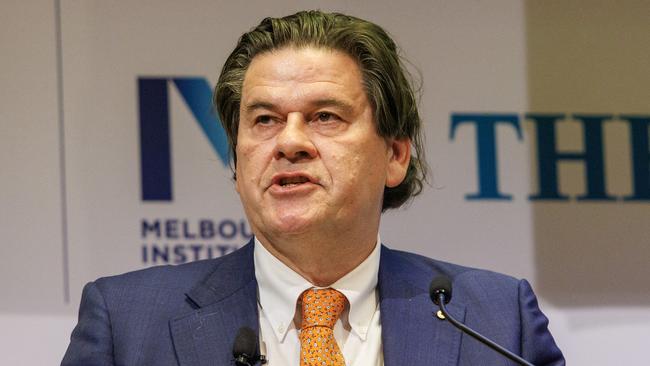Business warning on public sector pay surge
Business is demanding that state and federal governments ‘get their wages bill under control’ to help drive down inflation, after official data showed the public sector wage growth jumped in the June quarter.

Business is demanding state and federal governments “get their wages bill under control” to help drive down inflation, after official data showed public sector wage growth jumped in the June quarter while pay rises eased for workers in private enterprise.
Industry groups and economists warned wages growth of 4.1 per cent in the year to June was too high for the Reserve Bank to consider interest rate cuts, despite Workplace Relations Minister Murray Watt declaring there was “no evidence whatsoever that increasing wages is contributing to inflation”.
Wages increased by a softer than expected 0.8 per cent in the three months to June, driven by a 0.7 per cent increase in the private sector, bolstering confidence among economists that the heat was coming out of the labour market.
But public sector wages jumped 0.9 per cent, the highest June quarter rise in years and up from a 0.6 per cent increase in the March quarter, according to the Australian Bureau of Statistics.
Workers in the public service-dominated Australian Capital Territory recorded quarterly wage growth of 1.6 per cent – double the 0.8 per cent hike of Western Australia, the next-highest jurisdiction.
Public sector wages increased 3.9 per cent in the year to June, up from 3.1 per cent a year earlier.
Australian Industry Group chief executive Innes Willox said it was problematic that public sector wages growth was increasing at the same time private companies were “working hard to moderate wages growth because of the inflation it creates”. “That risks being undermined by governments who, concerningly, seem oblivious to the inflationary impacts and to the flow-on impacts those rises have on the private sector, who are also struggling with a tight labour market,” Mr Willox said.
“We have seen a series of very significant public sector wage increases being signed off by governments in recent months, which, at face value, are out of step with our need to get inflation under control.”
The commonwealth public sector wages bill is forecast to surge above $29.4bn this financial year, according to the budget papers in May, a full $2bn higher than the previous 12 months.
The growth in public sector pay comes on top of a series of government-backed pay hikes for childcare and aged-care workers, as well as a 3.75 per cent increase for 2.6 million award and minimum-wage earners.
Australian Chamber of Commerce and Industry chief executive Andrew McKellar said it would be harder for the private sector to attract employees given the increased benefits in the care economy and public sector.
“The fact that we are seeing wage rises where they are without offsetting productivity, it is just another factor that is feeding back into costs and ultimately feeding back into prices, keeping inflation sticky,” he said.
Mr McKellar disputed Senator Watt’s claim that wages were not contributing to inflation, given productivity growth was flat.
Wage rises in the year to June were strongest in the health, education, hospitality, retail and mining sectors.
RBA governor Michele Bullock last week warned that even modest wage gains could prove to be inflationary unless productivity growth picked up.
“If productivity doesn’t improve, then even wage rises around 3.5 per cent might not be enough to keep unit labour costs contained,” Ms Bullock warned.
In parliament question time on Tuesday, Jim Chalmers said the latest wages growth showed the government was helping ease cost-of-living pressures for workers. But with the fresh figures confirming a real wage cut for the second consecutive quarter – given inflation in the three months to June was 1 per cent – the Treasurer skirted around the pay reduction issue, instead belittling the opposition over its economic record.
“They hate wages growth, just like they hated it when rates didn’t go up,” Dr Chalmers said.
RBC Capital Markets chief economist Su-Lin Ong said the level of wages growth remained a risk due to “uncertainty” surrounding productivity growth.
She said the increase in public sector pay was consistent with the narrative that ongoing strength in the public sector was working in the “opposite direction” to the RBA’s interest rate settings.
KPMG chief economist Brendan Rynne said the public sector accounted for 25 per cent of the total increase in wages in the June quarter, up from 19 per cent in the same period last year.
“This reflects both substantial headcount increases and changes to new state and federal wage policies introduced across 2023,” Mr Rynne said. “It expands income in the economy and, even though private sector jobs still form the large majority of the labour market, it nonetheless needs to be pulled back.”
The ACTU criticised the “galling” attack from employers on the union push for care worker pay rises.
“Disability support care workers are highly qualified, committed and look after some of the most vulnerable Australians, but they often earn barely more than the minimum wage,” ACTU assistant secretary Joseph Mitchell told The Australian.
Mr Mitchell said the average Australian worker would be $4700 worse off if annual wage growth had continued at the same low rate as under the last Coalition government.
“From backing historic minimum-wage increases to strengthening workers’ rights and supporting pay rises for aged-care workers and early childhood educators, the Albanese government has shown they are on the side of working people,” he said.
Additional reporting: Ewin Hannan



To join the conversation, please log in. Don't have an account? Register
Join the conversation, you are commenting as Logout